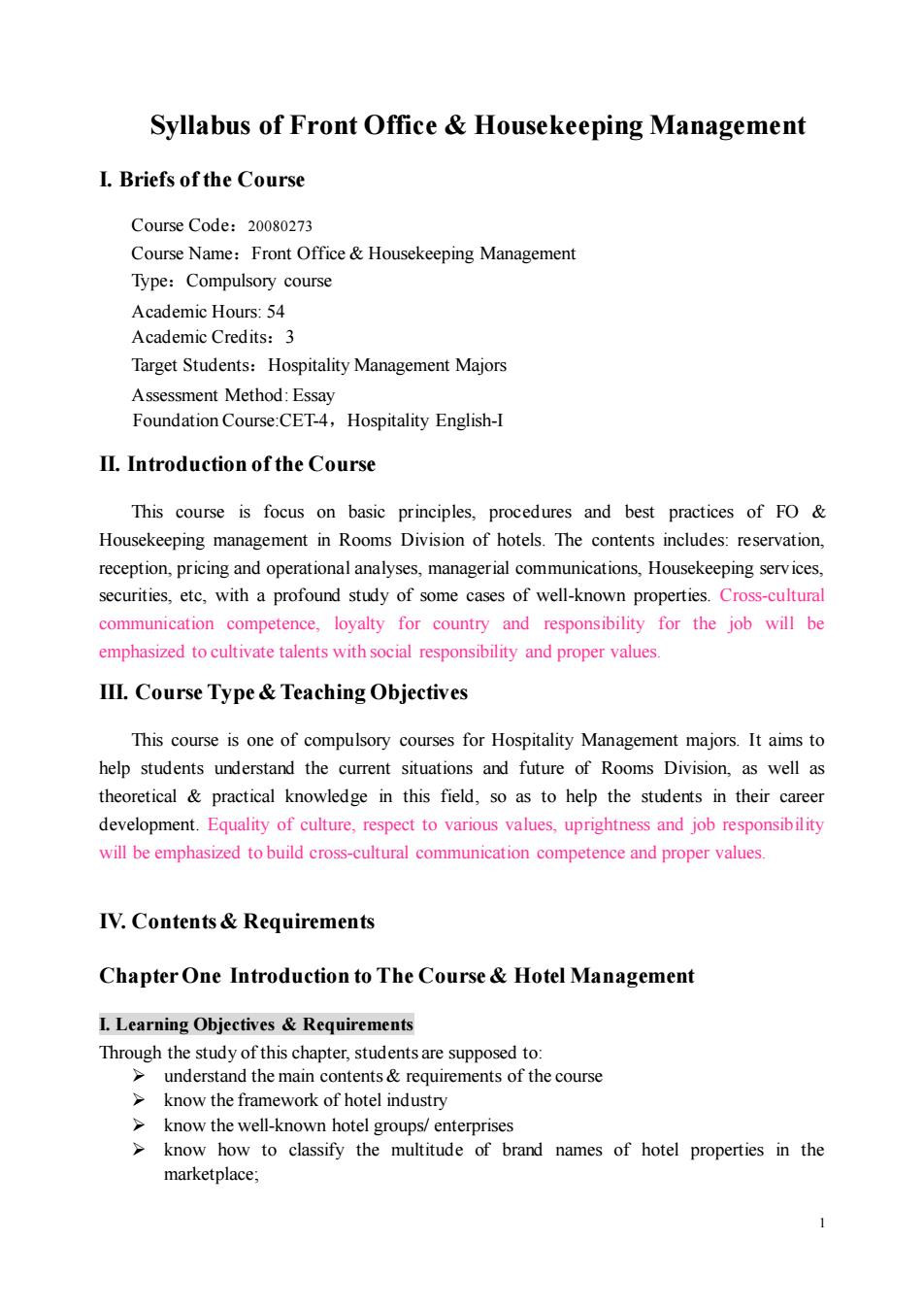
Syllabus of Front Office Housekeeping Management I.Briefs of the Course Course Code:20080273 Course Name:Front Office Housekeeping Management Type:Compulsory course Academic Hours:54 Academic Credits:3 Target Students:Hospitality Management Majors Assessment Method:Essay Foundation Course:CET-4,Hospitality English-I II.Introduction of the Course This course is focus on basic principles,procedures and best practices of FO Housekeeping management in Rooms Division of hotels.The contents includes:reservation, reception,pricing and operational analyses.managerial communications.Housekeeping serv ices. securities,etc,with a profound study of some cases of well-known properties.Cross-cultural communication competence.lovalty for country and responsibility for the job will be emphasized to cultivate talents with social responsibility and proper values. IIL.Course Type Teaching Objectives This course is one of compulsory courses for Hospitality Management majors.It aims to help students understand the current situations and future of Rooms Division,as well as theoretical&practical knowledge in this field,so as to help the students in their career development.Equality of culture,respect to various values,uprightness and job responsibility will be emphasized to build cross-cultural communication competence and proper values. IV.Contents Requirements Chapter One Introduction to The Course Hotel Management I.Learning Objectives Requirements Through the study of this chapter,students are supposed to: P understand the main contents&requirements of the course know the framework of hotel industry know the well-known hotel groups/ent rp >know how to classify the multitude of brand names of hotel properties in the marketplace
1 Syllabus of Front Office & Housekeeping Management I. Briefs of the Course Course Code:20080273 Course Name:Front Office & Housekeeping Management Type:Compulsory course Academic Hours: 54 Academic Credits:3 Target Students:Hospitality Management Majors Assessment Method: Essay Foundation Course:CET-4,Hospitality English-I II. Introduction of the Course This course is focus on basic principles, procedures and best practices of FO & Housekeeping management in Rooms Division of hotels. The contents includes: reservation, reception, pricing and operational analyses, managerial communications, Housekeeping services, securities, etc, with a profound study of some cases of well-known properties. Cross-cultural communication competence, loyalty for country and responsibility for the job will be emphasized to cultivate talents with social responsibility and proper values. III. Course Type & Teaching Objectives This course is one of compulsory courses for Hospitality Management majors. It aims to help students understand the current situations and future of Rooms Division, as well as theoretical & practical knowledge in this field, so as to help the students in their career development. Equality of culture, respect to various values, uprightness and job responsibility will be emphasized to build cross-cultural communication competence and proper values. IV. Contents & Requirements Chapter One Introduction to The Course & Hotel Management I. Learning Objectives & Requirements Through the study of this chapter, students are supposed to: ➢ understand the main contents & requirements of the course ➢ know the framework of hotel industry ➢ know the well-known hotel groups/ enterprises ➢ know how to classify the multitude of brand names of hotel properties in the marketplace;
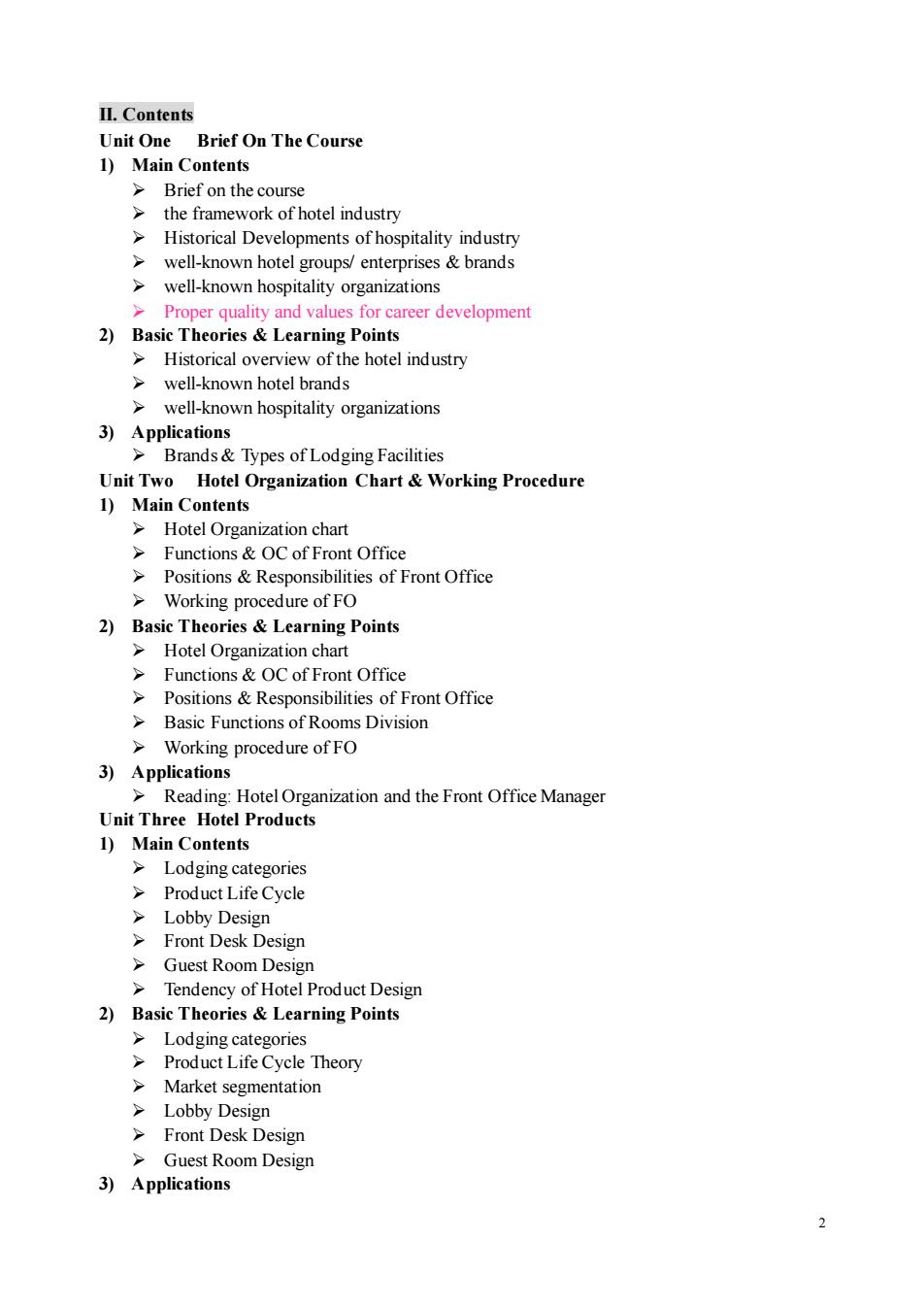
II.Contents Unit One Brief On The Course 1)Main Contents >Brief on the course >the framework of hotel industry Historical Deve opments of hospitality industry known hotel groups/enterprises brands well-known hospitality organizations >Proper quality and values for career development 2)Basic Theories Learning Points >Historical overview of the hotel industry nown hotel b rands well-known hospitality organizations 3)Applications >Brands&Types of Lodging Facilities Unit Two Hotel Organization Chart Working Procedure 1)Main Contents Hotel Organization chart >Functions OC of Front Office >Positions Responsibilities of Front Office Working procedure of FO 2)Basic Theories&Learning Points Hotel Organization chart Functions&OC of Front Office >Positions Responsibilities of Front Office >Basic Functions of Rooms Division >Working procedure of FO 3) Application Reading:Hotel Organization and the Front Office Manager Unit Three Hotel Products 1)Main Contents Lodging categories Lobby Desigr >Front Desk Design >Guest Room Design >Tendency of Hotel Product Design 2)Basic Theories Learning Points Lodging categore Product Life Cycle Theory >Market segmentation >Lobby Design >Front Desk Design Guest Room Design 3)Applications
2 II. Contents Unit One Brief On The Course 1) Main Contents ➢ Brief on the course ➢ the framework of hotel industry ➢ Historical Developments of hospitality industry ➢ well-known hotel groups/ enterprises & brands ➢ well-known hospitality organizations ➢ Proper quality and values for career development 2) Basic Theories & Learning Points ➢ Historical overview of the hotel industry ➢ well-known hotel brands ➢ well-known hospitality organizations 3) Applications ➢ Brands & Types of Lodging Facilities Unit Two Hotel Organization Chart & Working Procedure 1) Main Contents ➢ Hotel Organization chart ➢ Functions & OC of Front Office ➢ Positions & Responsibilities of Front Office ➢ Working procedure of FO 2) Basic Theories & Learning Points ➢ Hotel Organization chart ➢ Functions & OC of Front Office ➢ Positions & Responsibilities of Front Office ➢ Basic Functions of Rooms Division ➢ Working procedure of FO 3) Applications ➢ Reading: Hotel Organization and the Front Office Manager Unit Three Hotel Products 1) Main Contents ➢ Lodging categories ➢ Product Life Cycle ➢ Lobby Design ➢ Front Desk Design ➢ Guest Room Design ➢ Tendency of Hotel Product Design 2) Basic Theories & Learning Points ➢ Lodging categories ➢ Product Life Cycle Theory ➢ Market segmentation ➢ Lobby Design ➢ Front Desk Design ➢ Guest Room Design 3) Applications
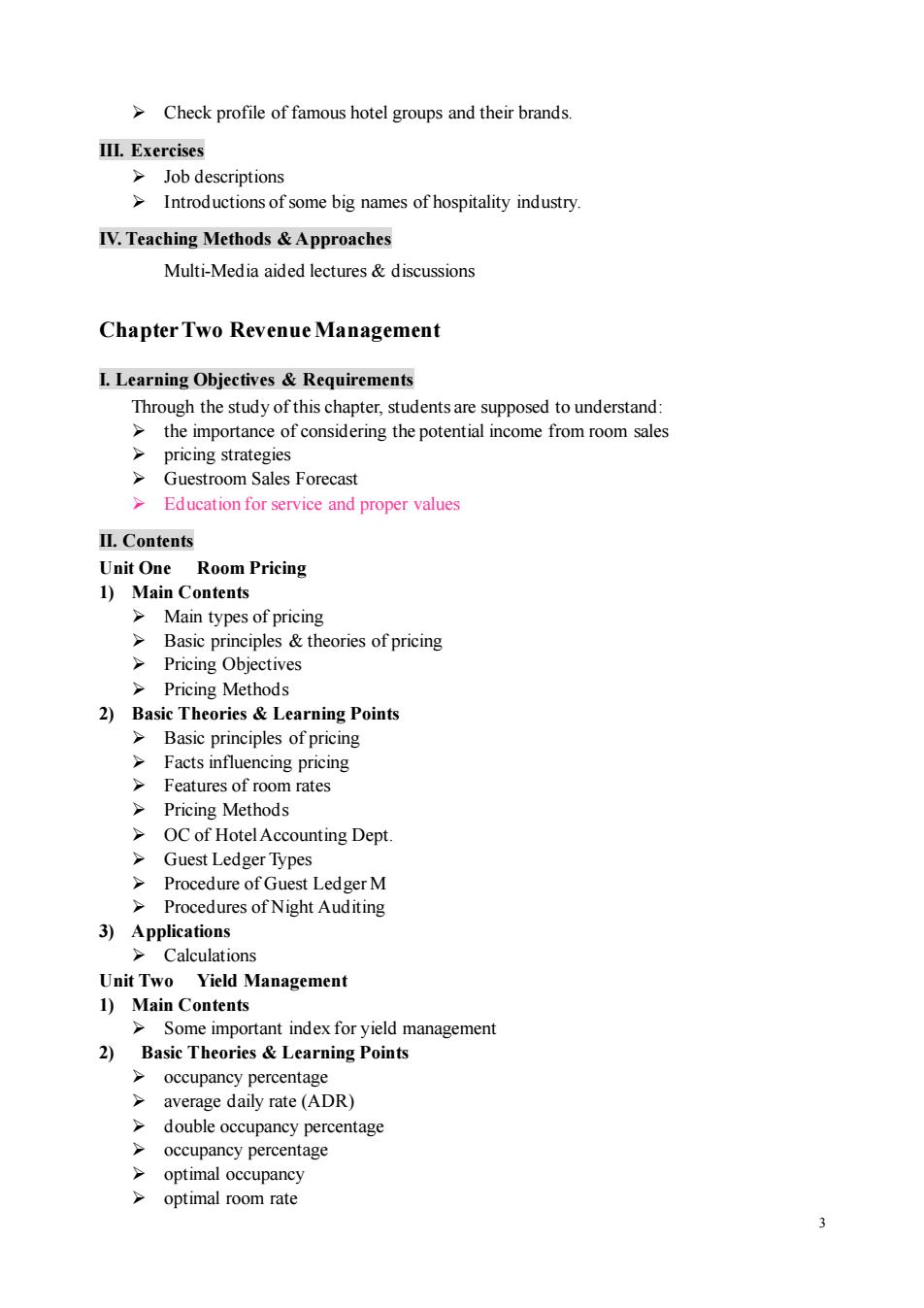
Check profile of famous hotel groups and their brands III.Exercises >Job descriptions >Introductions of some big names of hospitality industry. IV.Teaching Methods Approaches Multi-Media aided lectures&discussions Chapter Two Revenue Management I.Learning Objectives Requirements Through the study of this chapter,students are supposed to understand the importance of considering the potential income from room sales >pricing strategies >Guestroom Sales Forecast Education for service and proper values II.Contents Unit One Room Pricing 1)Main Contents Main type s of pricing AA Basic principles&theories of pricing Pricing Objectives >Pricing Methods 2)Basic Theories Learning Points Facts innlu ciples of pric ng pricing Features of room rates >Pricing Methods >OC of HotelAccounting Dept Guest Ledger Types Procedure ofG Ledger M Procedures of Night Auditing 3)Applications >Calculations Unit Two Yield Management 1)Main Contents Som e important index for yield management 2) Basic Theories Learning Points occupancy percentage average daily rate(ADR) double A occupancy percentage occupancy percentage optimal occupancy >optimal room rate
3 ➢ Check profile of famous hotel groups and their brands. III. Exercises ➢ Job descriptions ➢ Introductions of some big names of hospitality industry. IV. Teaching Methods & Approaches Multi-Media aided lectures & discussions Chapter Two Revenue Management I. Learning Objectives & Requirements Through the study of this chapter, students are supposed to understand: ➢ the importance of considering the potential income from room sales ➢ pricing strategies ➢ Guestroom Sales Forecast ➢ Education for service and proper values II. Contents Unit One Room Pricing 1) Main Contents ➢ Main types of pricing ➢ Basic principles & theories of pricing ➢ Pricing Objectives ➢ Pricing Methods 2) Basic Theories & Learning Points ➢ Basic principles of pricing ➢ Facts influencing pricing ➢ Features of room rates ➢ Pricing Methods ➢ OC of Hotel Accounting Dept. ➢ Guest Ledger Types ➢ Procedure of Guest Ledger M ➢ Procedures of Night Auditing 3) Applications ➢ Calculations Unit Two Yield Management 1) Main Contents ➢ Some important index for yield management 2) Basic Theories & Learning Points ➢ occupancy percentage ➢ average daily rate (ADR) ➢ double occupancy percentage ➢ occupancy percentage ➢ optimal occupancy ➢ optimal room rate
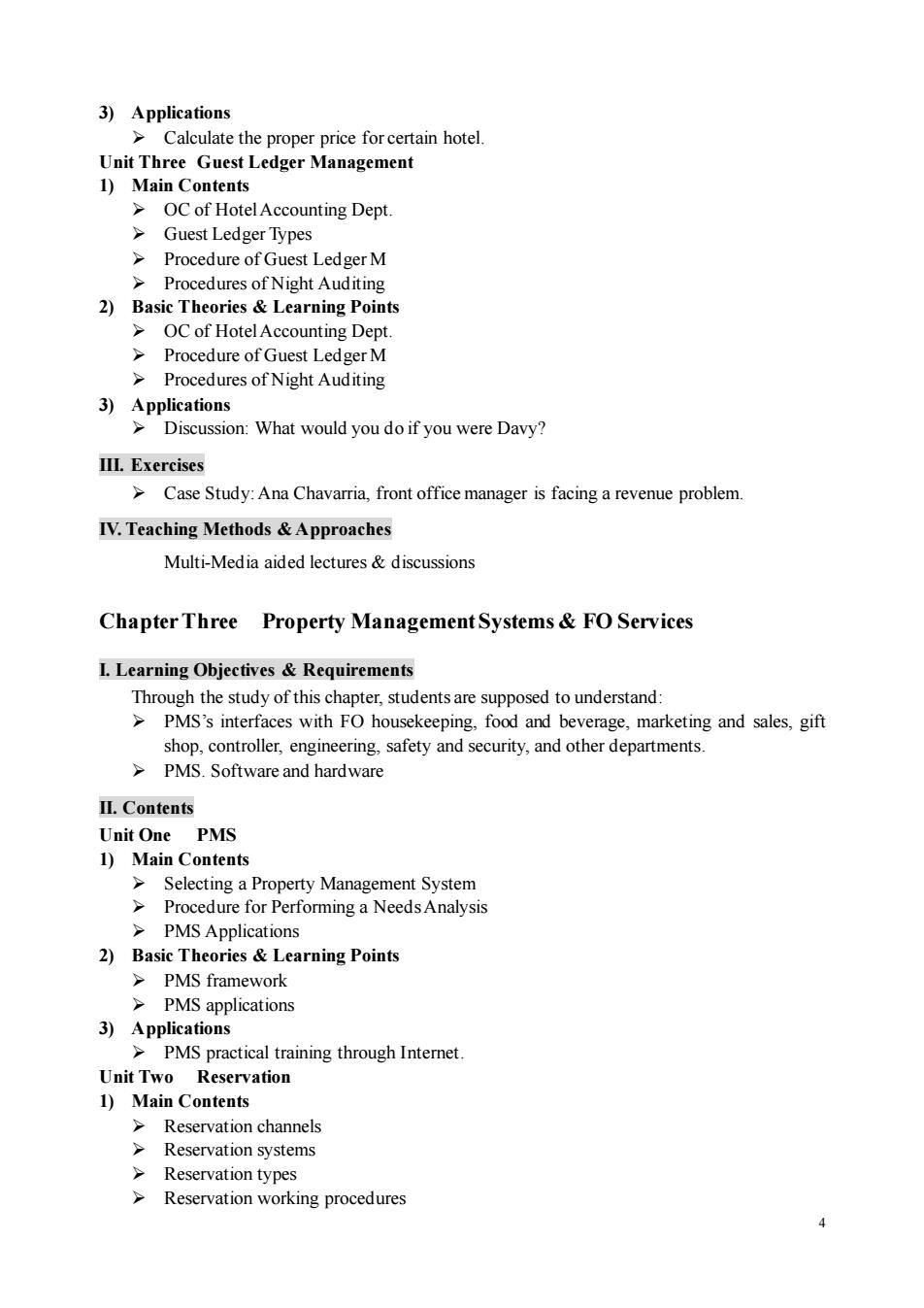
3)Applications Calculate the p Unit Three 1)Main Contents >OC of HotelAccounting Dept >Guest Ledger Types >Procedure of Guest Ledger M Procedures c ight Audi ing 2)Basic Theories Learning Points >OC of Hotel Accounting Dept >Procedure of Guest Ledger M >Procedures of night auditing 3)Appl Discussion:What would you do if you were Davy? II.Exercises Case Study:Ana Chavarria,front office manager is facing a revenue problem IV.Teaching Methods &Approaches Multi-Media aided lectures&discussions Chapter Three Property ManagementSystems FO Services L Learning Objectives Requirements Through the study of this chapter,students are supposed to understand: PMS's interfaces with FO housekeeping,food and beverage,marketing and sales,gift shop.controller.engineering.safety and security.and other departments >PMS.Software and hardware II.Contents Unit One PMS 1)Main Contents Selecting a Property Management System Procedure for Performing a Needs Analysis PMS Applications 2)Basic Theories Learning Points >PMS framework PMS applications 3)Applications >PMS practical training through Internet. Unit Two Reservation 1)Main Contents Reservation channels Reservation systems Reservation types >Reservation working procedures
4 3) Applications ➢ Calculate the proper price for certain hotel. Unit Three Guest Ledger Management 1) Main Contents ➢ OC of Hotel Accounting Dept. ➢ Guest Ledger Types ➢ Procedure of Guest Ledger M ➢ Procedures of Night Auditing 2) Basic Theories & Learning Points ➢ OC of Hotel Accounting Dept. ➢ Procedure of Guest Ledger M ➢ Procedures of Night Auditing 3) Applications ➢ Discussion: What would you do if you were Davy? III. Exercises ➢ Case Study: Ana Chavarria, front office manager is facing a revenue problem. IV. Teaching Methods & Approaches Multi-Media aided lectures & discussions Chapter Three Property Management Systems & FO Services I. Learning Objectives & Requirements Through the study of this chapter, students are supposed to understand: ➢ PMS’s interfaces with FO housekeeping, food and beverage, marketing and sales, gift shop, controller, engineering, safety and security, and other departments. ➢ PMS. Software and hardware II. Contents Unit One PMS 1) Main Contents ➢ Selecting a Property Management System ➢ Procedure for Performing a Needs Analysis ➢ PMS Applications 2) Basic Theories & Learning Points ➢ PMS framework ➢ PMS applications 3) Applications ➢ PMS practical training through Internet. Unit Two Reservation 1) Main Contents ➢ Reservation channels ➢ Reservation systems ➢ Reservation types ➢ Reservation working procedures
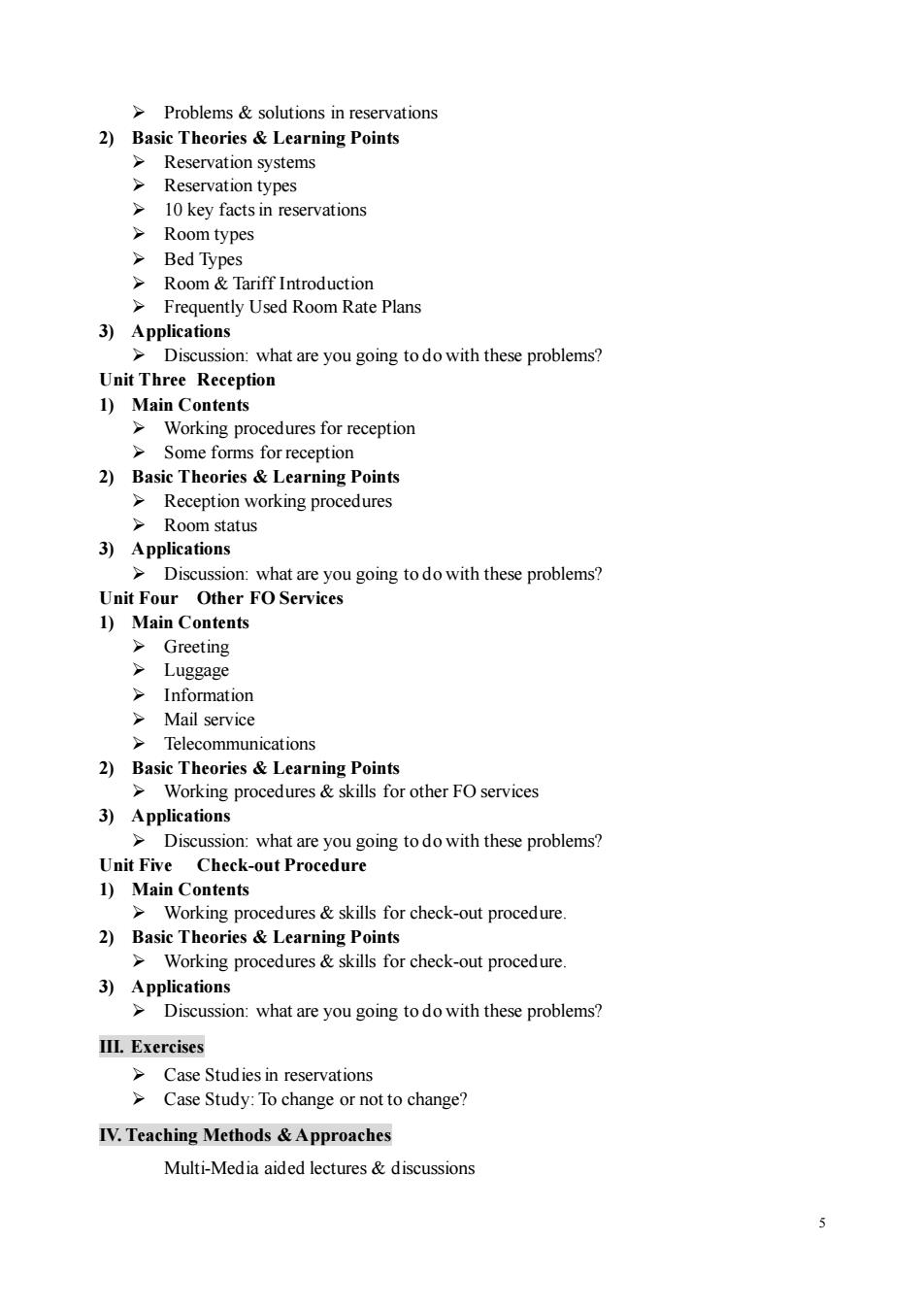
>Problems solutions in reservations 2)Basic Theories Learning Points Reservation syste Reservation types 10 key facts in reservations >Room types >Bed Types >Room&Tariff Introduction Frequently Used Room Rate Plans 3)Applications >Discussion:what are you going to do with these problems? Unit Three Reception 1)Main Contents ing procedures for reception Some forms for reception 2)Basic Theories Learning Points >Reception working procedures >Room status 3)Applications Discu ssion:what are you going todo with these problems? Unit Four Other FOServices 1)Main Contents >Greeting >Luggage Informatior >Mail service >Telecommunications 2)Basic Theories Learning Points >Working procedures skills for other FO services 3)Applicatior Discussion:what are you going todo with these problems Unit Five Check-out Procedure 1)Main Contents >Working procedures&skills for check-out procedure 2)Basic Theories Learning Points Working procedures&skill ls for check-out procedure 3)Applications >Discussion:what are you going to do with these problems? III.Exercises Case Studies in reservations >Case Study:To change or not to change? IV.Teaching Methods &Approaches Multi-Media aided lectures&discussions
5 ➢ Problems & solutions in reservations 2) Basic Theories & Learning Points ➢ Reservation systems ➢ Reservation types ➢ 10 key facts in reservations ➢ Room types ➢ Bed Types ➢ Room & Tariff Introduction ➢ Frequently Used Room Rate Plans 3) Applications ➢ Discussion: what are you going to do with these problems? Unit Three Reception 1) Main Contents ➢ Working procedures for reception ➢ Some forms for reception 2) Basic Theories & Learning Points ➢ Reception working procedures ➢ Room status 3) Applications ➢ Discussion: what are you going to do with these problems? Unit Four Other FO Services 1) Main Contents ➢ Greeting ➢ Luggage ➢ Information ➢ Mail service ➢ Telecommunications 2) Basic Theories & Learning Points ➢ Working procedures & skills for other FO services 3) Applications ➢ Discussion: what are you going to do with these problems? Unit Five Check-out Procedure 1) Main Contents ➢ Working procedures & skills for check-out procedure. 2) Basic Theories & Learning Points ➢ Working procedures & skills for check-out procedure. 3) Applications ➢ Discussion: what are you going to do with these problems? III. Exercises ➢ Case Studies in reservations ➢ Case Study: To change or not to change? IV. Teaching Methods & Approaches Multi-Media aided lectures & discussions
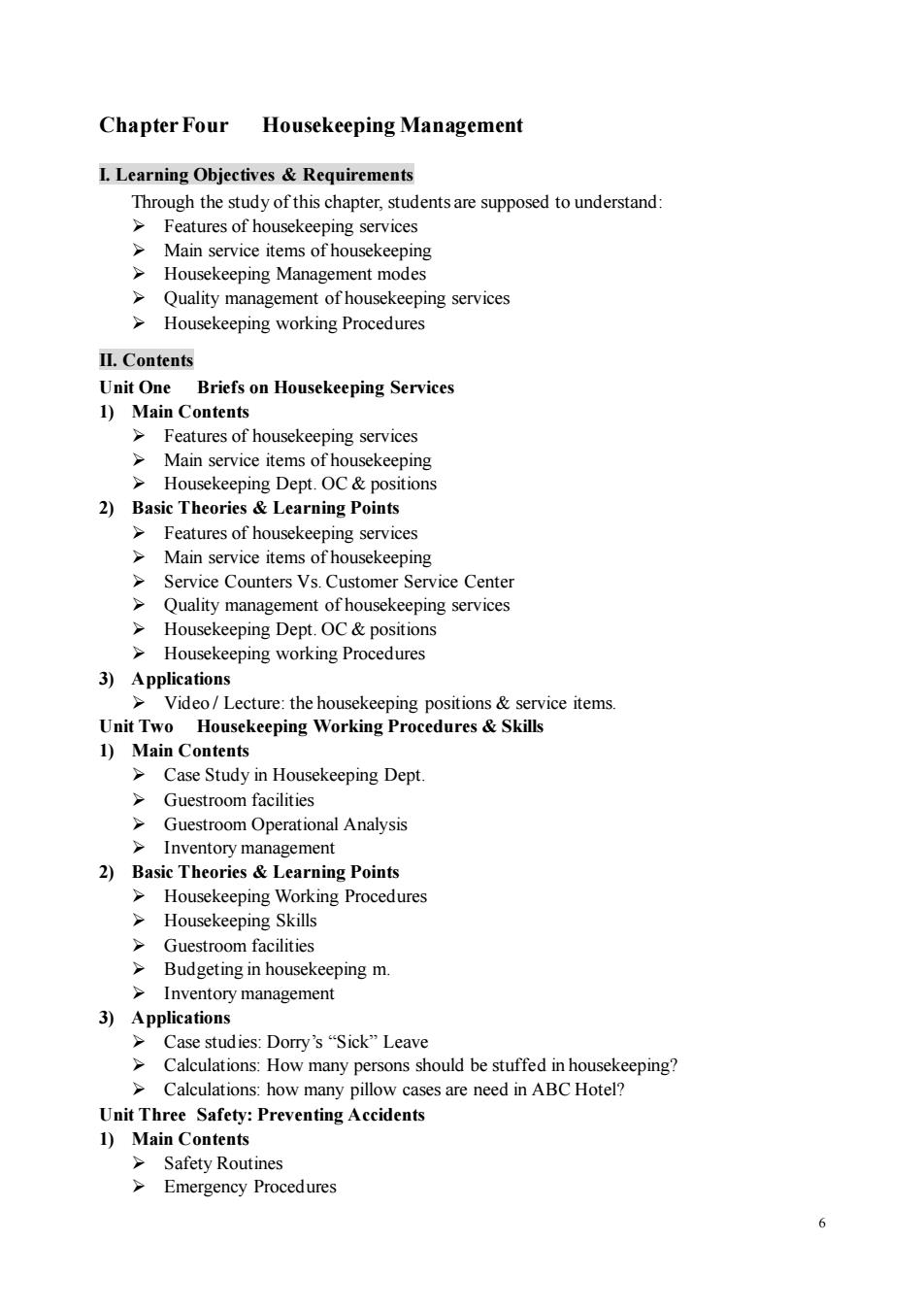
Chapter Four Housekeeping Management I.Learning Objectives Requirements Through the study of this chapter,students are supposed to understand: Features of housekeeping ervices Mair ns of ho sekeeping >Quality management of housekeeping services >Housekeeping working Procedures II.Contents Unit One Briefs on Housekeeping Services 1)Main Contents Features of housekeeping services Mair ervice ite Housek keeping eeping Dept.OCpositions 2)Basic Theories Learning Points Features of housekeeping services Main service items of housekeeping vice Counters Vs.Custome Service Center manage ment of housek eping services Housekeeping Dept.OC&positions >Housekeeping working Procedures 3)Applications Video/Lecture:the item Unit Two Housekeeping Working Procedures&Skills ))Main Contents >Case Study in Housekeeping Dept >Guestroom facilities >Guestroom Operational Analysis In geme 2)Basic Theories Learning Points Housekeeping Working Procedures >Housekeeping Skills >Guestroom facilities Budgeting in housekeeping m >Inventory management 3)Applications Case studies::Dorry's“sick”Leave >Calculations:How many persons should be stuffed in housekeeping? Calculations:how many pillow cases are need in abc hotel? Unit Three Safety:Preventing Accidents 1)Main Contents >Safety Routines >Emergency Procedures
6 ChapterFour Housekeeping Management I. Learning Objectives & Requirements Through the study of this chapter, students are supposed to understand: ➢ Features of housekeeping services ➢ Main service items of housekeeping ➢ Housekeeping Management modes ➢ Quality management of housekeeping services ➢ Housekeeping working Procedures II. Contents Unit One Briefs on Housekeeping Services 1) Main Contents ➢ Features of housekeeping services ➢ Main service items of housekeeping ➢ Housekeeping Dept. OC & positions 2) Basic Theories & Learning Points ➢ Features of housekeeping services ➢ Main service items of housekeeping ➢ Service Counters Vs. Customer Service Center ➢ Quality management of housekeeping services ➢ Housekeeping Dept. OC & positions ➢ Housekeeping working Procedures 3) Applications ➢ Video / Lecture: the housekeeping positions & service items. Unit Two Housekeeping Working Procedures & Skills 1) Main Contents ➢ Case Study in Housekeeping Dept. ➢ Guestroom facilities ➢ Guestroom Operational Analysis ➢ Inventory management 2) Basic Theories & Learning Points ➢ Housekeeping Working Procedures ➢ Housekeeping Skills ➢ Guestroom facilities ➢ Budgeting in housekeeping m. ➢ Inventory management 3) Applications ➢ Case studies: Dorry’s “Sick” Leave ➢ Calculations: How many persons should be stuffed in housekeeping? ➢ Calculations: how many pillow cases are need in ABC Hotel? Unit Three Safety: Preventing Accidents 1) Main Contents ➢ Safety Routines ➢ Emergency Procedures
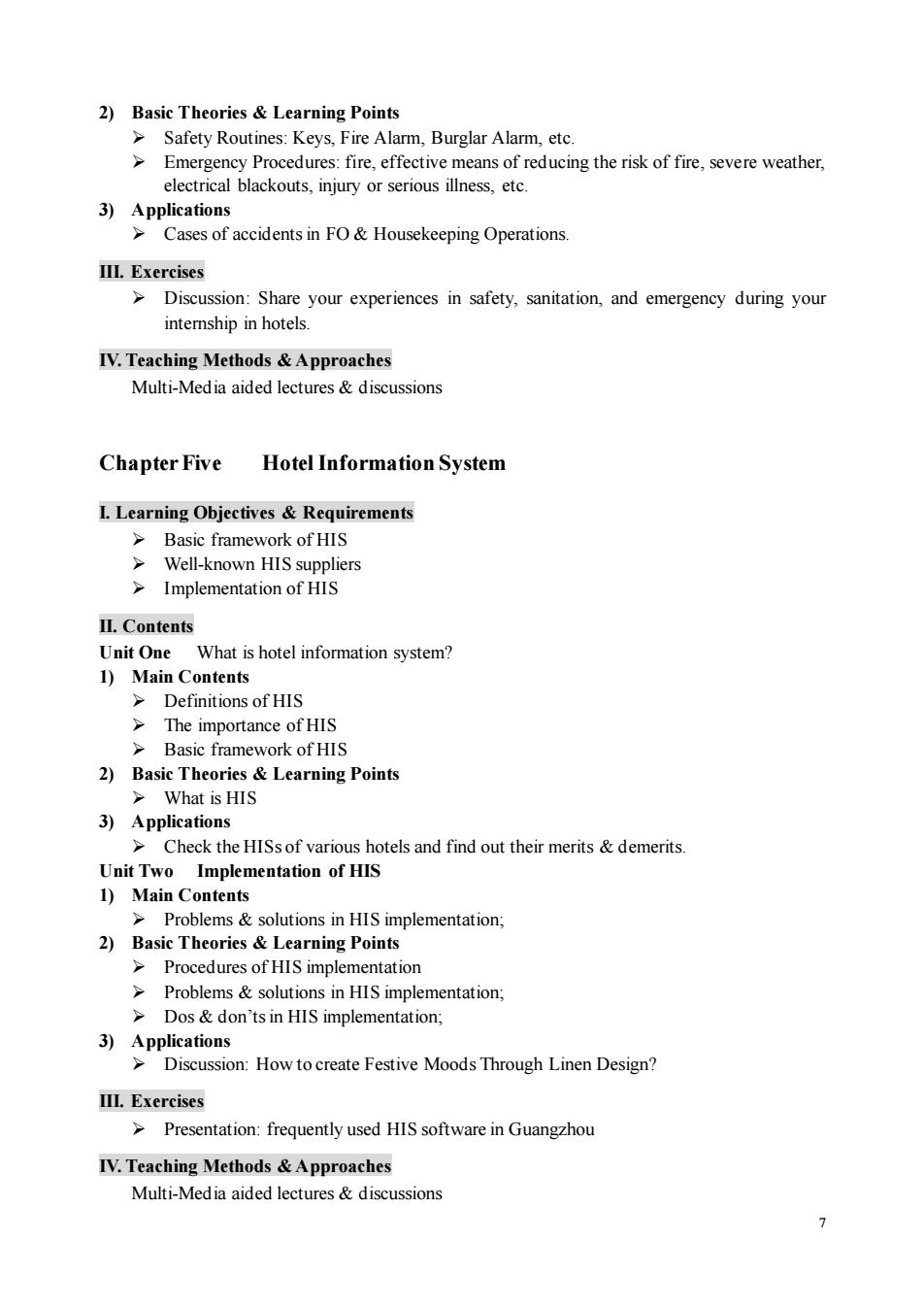
2)Basic Theories Learning Points >Safety Routines:Keys,Fire Alarm,Burglar Alarm,etc y Proced re,effective means reducing the risk of fire,severe weather, 3)Applications >Cases of accidents in FO&Housekeeping Operations III.Exercises >Discussion:Share your experiences in safety,sanitation,and emergency during your internship in hotels. IV.Teaching Methods &Approaches Multi-Media aided lectures&discussions Chapter Five Hotel Information System I.Learning Objectives Requirements Basic framework of HIS Well-known HIS suppliers >Implementation of HIS II.Contents Unit One What is hotel information system? 1)Main Contents >Definitions of HIS 之The importace ofHIS Basic fra work of HIS 2)Basic Theories Learning Points >What is HIS 3)Applications >Check the HiSs of various hotels and find out their merits demerits Unit Two Implementation of HIS 1)Main Contents >Problems solutions in HIS implementation; 2)Basic Theories Learning Points >Procedures of HIS implementation Problems&solutions in HIS implementation: Dos&don'ts in HIS implementation: 3)Applications >Discussion:How to create Festive Moods Through Linen Design? III.Exercises >Presentation:frequently used HIS software in Guangzhou IV.Teaching Methods &Approaches Multi-Media aided lectures&discussions
7 2) Basic Theories & Learning Points ➢ Safety Routines: Keys, Fire Alarm, Burglar Alarm, etc. ➢ Emergency Procedures: fire, effective means of reducing the risk of fire, severe weather, electrical blackouts, injury or serious illness, etc. 3) Applications ➢ Cases of accidents in FO & Housekeeping Operations. III. Exercises ➢ Discussion: Share your experiences in safety, sanitation, and emergency during your internship in hotels. IV. Teaching Methods & Approaches Multi-Media aided lectures & discussions ChapterFive Hotel Information System I. Learning Objectives & Requirements ➢ Basic framework of HIS ➢ Well-known HIS suppliers ➢ Implementation of HIS II. Contents Unit One What is hotel information system? 1) Main Contents ➢ Definitions of HIS ➢ The importance of HIS ➢ Basic framework of HIS 2) Basic Theories & Learning Points ➢ What is HIS 3) Applications ➢ Check the HISs of various hotels and find out their merits & demerits. Unit Two Implementation of HIS 1) Main Contents ➢ Problems & solutions in HIS implementation; 2) Basic Theories & Learning Points ➢ Procedures of HIS implementation ➢ Problems & solutions in HIS implementation; ➢ Dos & don’ts in HIS implementation; 3) Applications ➢ Discussion: How to create Festive Moods Through Linen Design? III. Exercises ➢ Presentation: frequently used HIS software in Guangzhou IV. Teaching Methods & Approaches Multi-Media aided lectures & discussions
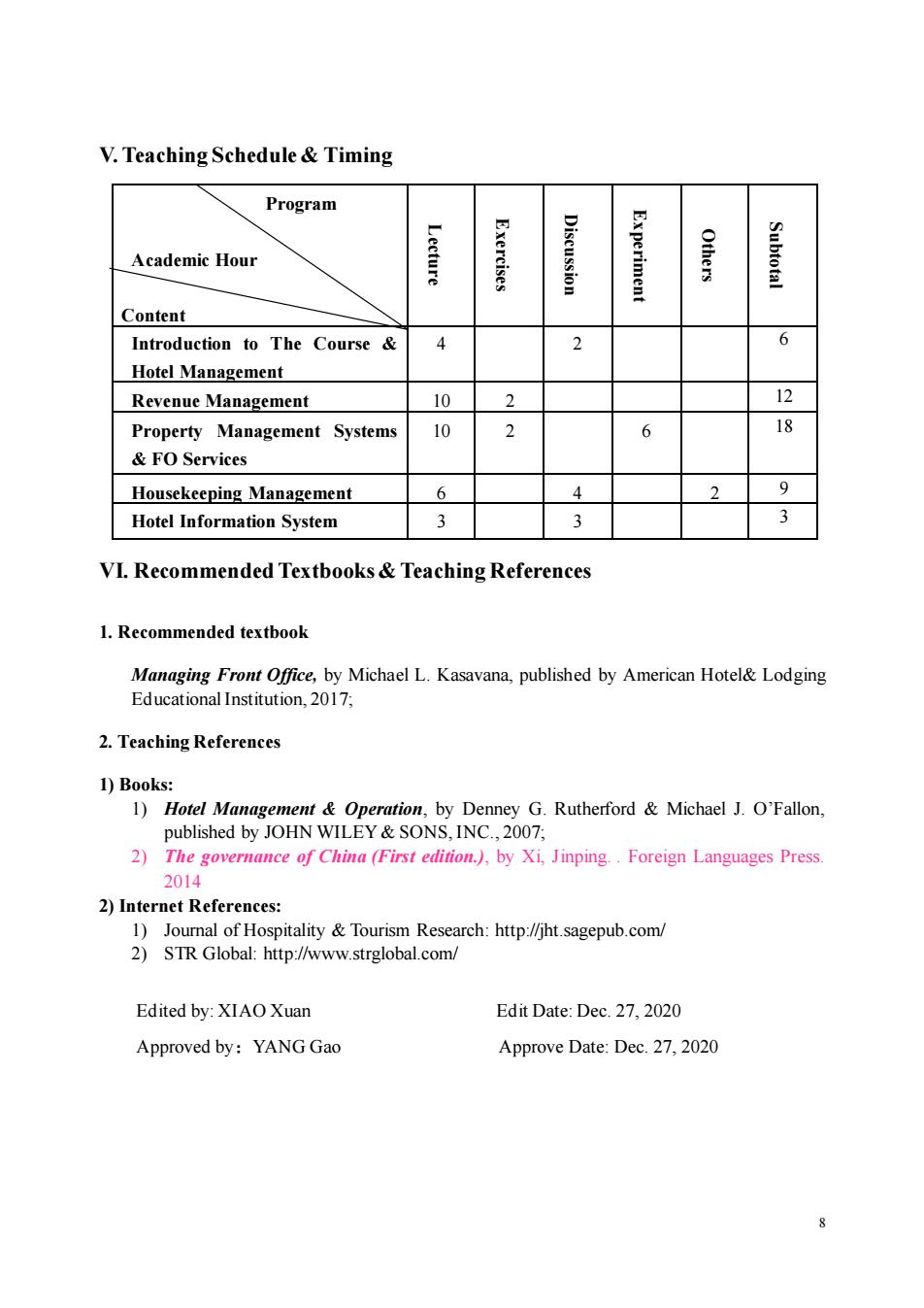
V.Teaching Schedule Timing Program Academic Hour Lecture Exercises Experimen btota Content Introduction to The Course 6 Hotel Management Revenue Management 10 2 12 Property Management Systems 10 2 6 &FO Services Housekeeping Management 6 9 Hotel Information System 3 3 3 VI.Recommended Textbooks Teaching References 1.Recommended textbook Managing Front Office,by Michael L.Kasavana,published by American Hotel&Lodging Educational Institution,2017; 2.Teaching References 1)Books: 1)Hotel Management Operation,by Denney G.Rutherford Michael J.O'Fallon, published by JOHN WILEY SONS,INC.,2007; 2)The governance of China (First edition.),by Xi,Jinping..Foreign Languages Press 2014 2)Internet References: 1)Journal of Hospitality Tourism Research:http://jht.sagepub.com/ 2)STR Global:http://www.strglobal.com/ Edited by:XIAO Xuan Edit Date:Dec.27,2020 Approved by:YANG Gao Approve Date:Dec.27,2020
8 V. Teaching Schedule & Timing Program Academic Hour Content Lecture Exercises Discussion Experiment Others Subtotal Introduction to The Course & Hotel Management 4 2 6 Revenue Management 10 2 12 Property Management Systems & FO Services 10 2 6 18 Housekeeping Management 6 4 2 9 Hotel Information System 3 3 3 VI. Recommended Textbooks & Teaching References 1. Recommended textbook Managing Front Office, by Michael L. Kasavana, published by American Hotel& Lodging Educational Institution, 2017; 2. Teaching References 1) Books: 1) Hotel Management & Operation, by Denney G. Rutherford & Michael J. O’Fallon, published by JOHN WILEY & SONS, INC., 2007; 2) The governance of China (First edition.), by Xi, Jinping. . Foreign Languages Press. 2014 2) Internet References: 1) Journal of Hospitality & Tourism Research: http://jht.sagepub.com/ 2) STR Global: http://www.strglobal.com/ Edited by: XIAO Xuan Edit Date: Dec. 27, 2020 Approved by:YANG Gao Approve Date: Dec. 27, 2020